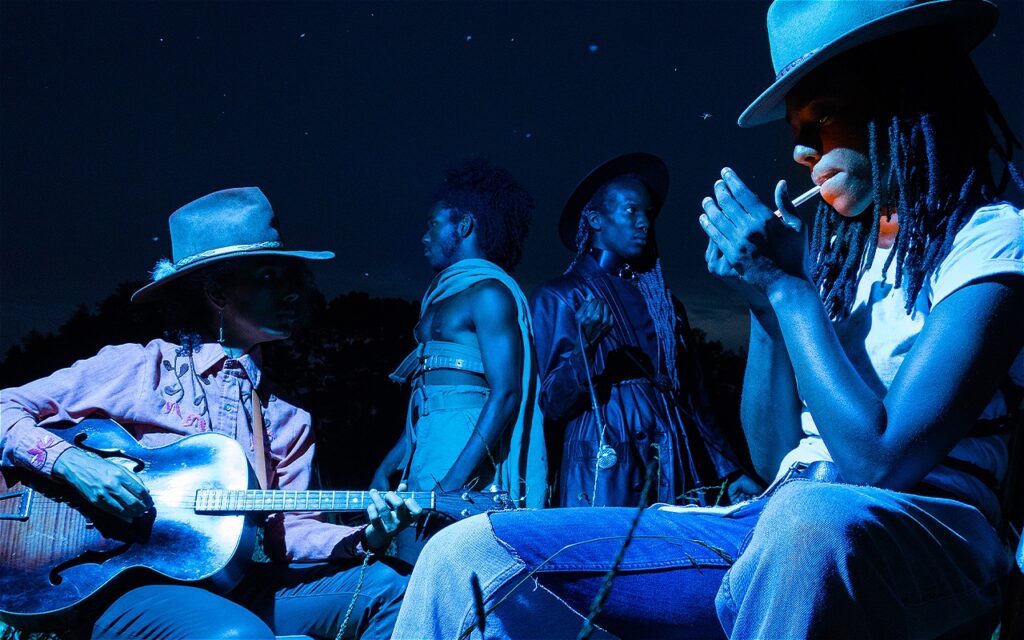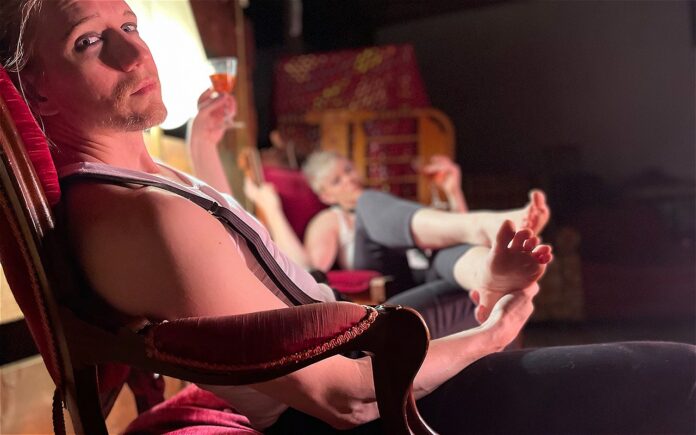Queer artists are known for pushing boundaries, investigating social norms, and putting their works in conversation with the past, present and future. At this year’s Philadelphia Fringe Festival, two queer-led companies are creating work that speaks to the current moment by looking at history and tradition in the United States and Europe through the prisms of gender and sexuality. In addition to their intellectual spirit, both promise to create a really good time for their audiences.
“Baal & Dix” (Sept. 7-12), from the artistic collective Die-Cast, puts German Expressionist artists Bertolt Brecht and Otto Dix in conversation with each other, drawing parallels between the Weimar Republic and contemporary times. Ninth Planet’s “high noon” (Sept. 5-18) explores the enduring mythology of the American West through an explicitly Black and queer lens, expanding the possibilities of genre and archetype. Both works aim to use old forms in an effort to say something new.
With “high noon” — a co-production of Fringe and the Cannonball Festival, an artist-driven performance hub — Ninth Planet intends to take a multidisciplinary, movement-based approach to its investigation of the Cowboy mythos, according to director and co-creator Nia Benjamin.
“Each of our projects are shaped around the creative team we assemble,” Benjamin told PGN. “This is a team that features two really incredibly talented dancers, two really incredibly talented musicians, and we at Ninth Planet are bringing our theatrical history and language to their skills.”
Benjamin took the idea of “high noon” from the Western movies they watched with their father growing up in Florida. “That was the first place where I understood my dad’s relationship to masculinity and gender, by watching ‘Dirty Harry’ films with him and seeing Clint Eastwood on the big screen,” they said. “I was always really interested, as someone who loves movies, in the cinematic capabilities of the cowboy and the Western. As I got older and began to understand the history of these films, it started to become a really complicated relationship: seeing the playfulness and the joy that [my father] found in these movies, and also knowing the history of the West was formed. And also thinking about never seeing anyone who looked like me or like my father in these movies.”
Benjamin credits the queer-themed “Brokeback Mountain” with broadening their expectations of the kinds of stories a Western movie could tell. They also cited moving to Philadelphia and becoming acquainted with the Fletcher Street Riding Club as a cultural touchpoint in understanding the history of Black horsemanship. Benjamin and Ninth Planet are taking an intentional approach with “high noon” of centering Black and queer experiences within the Western narrative tradition.

“Setting [“high noon”] in Philadelphia feels like we are paying homage to Fletcher Street stables and all the other Black and urban cowboys around the country,” Benjamin said. “For me and my collaborators, as we dug into the myth of the cowboy and the shape of the cowboy, we talked a lot about labor. The cowboy was originally a job — ranch hand, cow hand, that was a literal job title. As we think about the history of Black people in America and the African diaspora, there is a real tie to labor. We are seeing the gesture and the tension and the tightness of the cowboy as a way to express the history of labor.”
“Baal & Dix” puts the works of Brecht and Dix in conversation with current attitudes toward sexuality and identity. Performed at Brauhaus Schmitz, which claims to have the largest selection of German beers in the world, it takes the audience on a journey to the society that created these artists, which may or may not be different from the world we live in now.
“We’re looking at their context, their tropes of masculinity and misogyny, and thinking about how we can at once appreciate the art while identifying what’s contextually problematic now about those artists,” said Jarod Hanson, a performer in the production. “The piece is like a cheeky dramaturgical analysis — we’re exploring the piece while also offering multiple perspectives on the work and the artists.”
Both Brecht, who fled to Sweden and the United States during the Third Reich, and Dix, who was conscripted during World War II, were regarded as degenerate artists in Nazi Germany. “Baal & Dix,” which borrows the first half of its title from an early Brecht play, considers what it means to be degenerate, and the ways that such a term could be reclaimed.
“We’re asking what masculinity means today in comparison to back then,” said Hanson. “How do we reconcile this weird anti-hero of Baal with this beautiful, homoerotic text? And in Otto Dix’s work, it was somewhat exploitative of the people he was painting, many of whom were sex workers. So we’re sort of trying to personify the body and bring in different perspectives and opinions on all of these things.”
Han Van Sciver, an actor and musician involved in the creation of “Baal & Dix,” noted that while Brecht is canonically assumed to be straight, his work often deals with homoeroticism in frank terms, many of which were unusual at the time.
“It’s such a weird text, which is something that appealed to me,” Van Sciver said in an interview. “It’s a play about a womanizer, who I think is in love with his best friend. I often find that these things that we think of as problematic or quite misogynist have a very angry and hurting queer person working at the center. There’s something worthwhile about getting in there and seeing what’s what.”
Through these explorations, Die-Cast and Ninth Planet continue to push the boundaries of queer art and expand preconceived notions of history and sexuality. That’s what the Fringe, and the fringes, is for.
For tickets and information on these productions, including Covid-19 safety protocols, visit fringearts.com.

